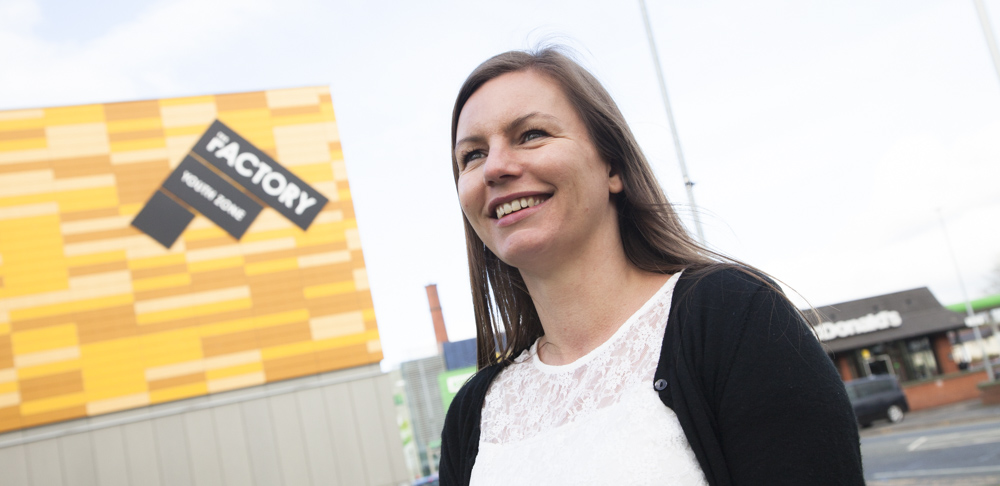“We’ve got lots going on at the moment,” Pamela says as she leads me upstairs for our chat. “We’re preparing for a local parade just now.”
The Chill Out Room at The Factory Youth Zone has comfy chairs and sofas; books about anger management and sexual health, and lots of motivational posters.
I start at the beginning. “When did this place open? How long have you been here?”
“We opened in February 2012,” says Pamela Mason, “and I’ve been here from the start.”
 A large colourful box of a building right in the centre of Harpurhey, The Factory Youth Zone is unusual for a youth centre. Pamela explains that it’s run by a charity and the building was paid for in part by local businesses and patrons.
A large colourful box of a building right in the centre of Harpurhey, The Factory Youth Zone is unusual for a youth centre. Pamela explains that it’s run by a charity and the building was paid for in part by local businesses and patrons.
“We got funding from people and organisations who wanted to invest in young people,” she says. “And there are more centres like this now open in Oldham, Wigan, Preston, all over.
“The traditional youth service provided by local authorities doesn’t exist any more. We’re the new path for that work. Our job is to keep the options open for young people.”
Pamela’s career in youth work started as a work placement at a youth club as part of a social care qualification. In her first paid role in Wythenshawe she and her colleagues toured the estate with their transit van.
“We’d park in hotspots where young people would congregate,” she recalls, “and we’d throw open the side of van where there’d be some seating, a kettle and even an X-box. It was up to us to discourage otherwise antisocial behaviour.”
Her first role at The Factory Youth Zone was as an outreach worker but has since moved through the ranks and is now Head of Youth managing a team of full and part-time staff.
“What sort of challenges do young people face in this area?” I ask.
“Well, as you know, the statistics show that Harpurhey and Moston are near the top – or the bottom, depending on which way you look at it – for things like domestic violence, child sexual exploitation, poor school attendance, poor health, drug and alcohol abuse. These all affect young people directly or indirectly.”
“And The Factory Youth Zone is making a difference?”
“Absolutely,” says Pamela. “We have up to 150 young people attending our senior sessions each week and about 140 coming to the junior sessions. And they keep coming back, so we must be doing our job well.”
But Pamela and her colleagues can’t do everything. “We often need to refer young people to other services – mental health, debt advice, housing or employment – and all these are under-resourced. It can take time before our young people get the extra help and support they need.”
The Fourteen programme has helped. The Factory Youth Zone has been awarded funding to run an 18-month project that encourages 14-19-year-olds to train as young leaders.
“We’ve been able to employ an extra member of staff who’s written the Learn2Lead programme which includes safeguarding training, a social action campaign and voluntary work placements,” says Pamela.
“It’s great to see the older ones with Young Leader printed on the back of their T-shirts, acting as role models for our junior members.”
“And what about being part of the Local Reference Group for the Fourteen programme?” I ask, “Has that been useful?”
“It’s like having a whole new group of colleagues,” enthuses Pamela, “with lots of new resources and contacts. You get to know much more about what’s happening in the area and learn new ways of working.
“It’s been great to get to know all the other community groups in our Big Meets, and we’re hoping, as part of the Learn2Lead project, to place some young volunteers with those groups.”
To find out what’s available for young people at The Factory Youth Zone, check their website or call into the reception.